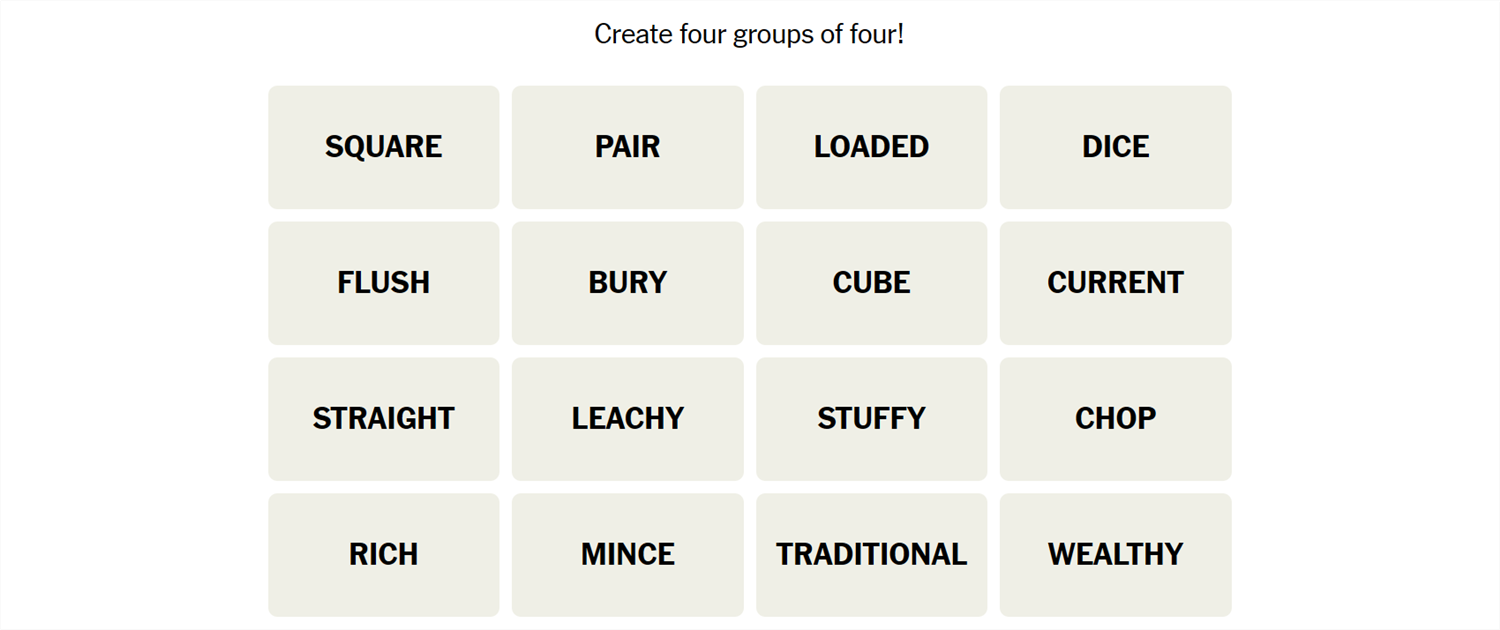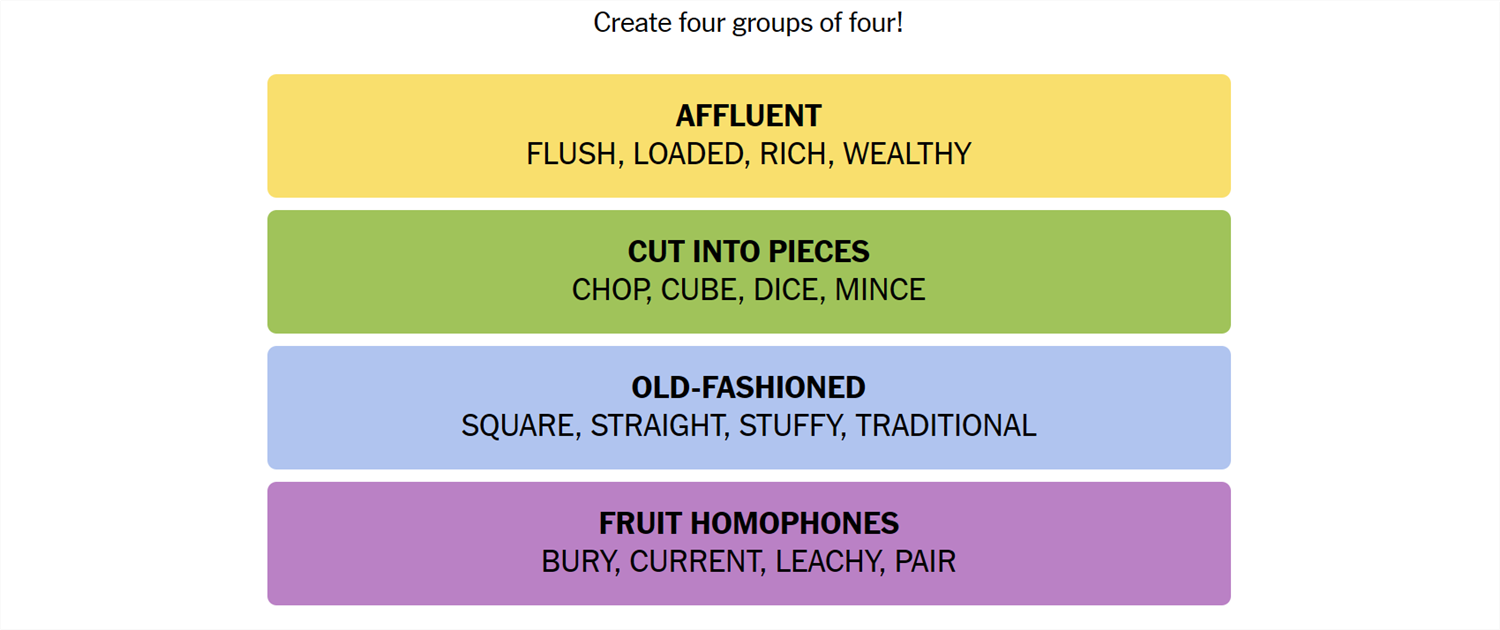
May 19 New York Times Crosswords Exposed: Tips and Answers for Brain-Teasing Challenges #343

May 19 New York Times Crosswords Exposed: Tips and Answers for Brain-Teasing Challenges #343
Quick Links
- What Is Connections?
- Hints for Today’s Connections Groups
- What Are Today’s Connections Groups?
- Today’s NYT Connections Answers
- How Did We Solve This Connections Game?
- How Do You Guess Connections Groups?
Connections is a game from the New York Times that challenges you to find the association between words. It sounds easy, but it isn’t—Connections categories can be almost anything, and they’re usually quite specific. If you need a hand getting the answers, we’ve got you covered.
What Is Connections?
Connections is a game from the New York Times. The objective is simple: sort 16 words into groups of 4. Each group of words will be connected by some common idea or theme. That common element could be anything. We have seen everything from games that rely on the number of letters in the words to categories that require you to spot an extra letter at the end of the word. Sometimes they’re references to economics, other times they reference fairy tales. There is no telling what sort of association there will be between words.
Once you’re confident you understand the connection, select 4 words, then hit “Submit.” You have only four attempts in total, so don’t be too guess-happy.
Hints for Today’s Connections Groups
Here are a few hints for the 343rd Connections game to get you started:
- Yellow: Tons of cash.
- Green: Small chunks.
- Blue: Also an alcoholic drink.
- Purple: Sounds like something you’d eat.
What Are Today’s Connections Groups?

If you still need help, the actual group names are:
- Yellow: Affluent
- Green: Cut Into Pieces
- Blue: Old-Fashioned
- Purple: Fruit Homophones
Today’s NYT Connections Answers

Affluent (Yellow):
Flush, Loaded, Rich, Wealthy
Cut into Pieces (Green):
Chop, Cube, Dice, Mince
Old-Fashioned (Blue):
Square, Straight, Stuffy, Traditional
Fruit Homophones (Purple):
Bury, Current, Leachy, Pair
How Did We Solve This Connections Game?
May 19th was a step-down in difficulty from the last game, or so it seemed anyway.
The first group I spotted was Yellow, “Affluent.” The words were flush, loaded, rich, and wealthy. Loaded, rich, and wealthy were all pretty obvious, but flush was slightly harder to catch, since the expression is usually “Flush with Cash” rather than just “flush.”
The next word I happened to look at was traditional, so I went with that next. Current jumps out as an antonym, but there don’t seem to be any other words related to a time period. That lead me to look at the meaning of traditional: “Old-fashioned.” That made me think of stuffy, straight, and square—funny enough, “square” is a pretty old-fashioned way of saying traditional. Blue was “Old-Fashioned.”
Chop, cube, dice, and mince are all verbs that describe cutting something up. Usually they’re used when referring to food preparation. They were in the Green group, “Cut into Pieces.”
That left bury, current, leachy, and pair. They didn’t seem to have anything in common, but saying them out loud helped. They’re homophones for fruits. The Purple group was “Fruit Homophones.”
How Do You Guess Connections Groups?
There is no quick, reliable way to approach Connections like there is with Wordle, since Connections isn’t algorithmic. However, there are a few things to keep in mind that can help.
- Look for similar parts of speech. Are some words verbs and others nouns? Are some adjectives? Try mentally grouping them based on those categories and see if any other patterns jump out at you.
- Are the words synonyms? Sometimes categories will just be synonyms for a phrase, or very close to synonyms. Don’t rely too closely on this, though. Occasionally, Connections will deliberately throw in words that are sometimes synonyms to mislead you.
- Try saying the words. Sometimes, saying the words helps. One puzzle we saw included the words go, rate, faster, clip, pace, speed, move, commute, and hurry—all of which are obviously related to the idea of motion. However, when you say them, it becomes a little more obvious that only four (go, move, hurry, faster) are things you’d actually say to prompt someone to get moving.
- Expect the red herring . Connections usually has words that could be plausibly, yet incorrectly, grouped together. Take the words Bud, Corona, and Light, as an example. You might instinctively see those three words together and assume they’re lumped together in a category related to beer—but they weren’t.
- Look for distinct words. If a word on your board doesn’t have multiple meanings or can really only be used in one context, try using that word as the basis for a category.
- Shuffle the board. Sometimes, moving words around will help you look at them in new ways.
If you didn’t solve this one, don’t feel too bad—there’s always tomorrow! And those words may align with a topic you’re interested in, giving you a leg up on the competition.
Also read:
- [New] 2024 Approved Leading Synthetic PS3 Games for PC Gamers
- [New] Expert Strategies for Efficient Funimate Use for 2024
- [New] From Start-Up to Success How to Register a Professional Account on Instagram for 2024
- [Updated] 2024 Approved Live From the Cloud Effective DJI Drone Broadcasting Tips
- [Updated] Building Mental Armor Against Online Critics
- Effortless Book Shopping for Kindle Users - A Comprehensive Tutorial From ZDNet
- Elevate Your Home with Alexa: Echo Pop vs Echo Dot Face-Off to Find Your Perfect Companion - Expert Advice on ZDNET
- Exciting Announcement by Southwest Airways - Positive Impact on Most, Exception Being Tech Mogul Bill Gates.
- In 2024, Does Airplane Mode Turn off GPS Location On Vivo V29e? | Dr.fone
- Millions Misled Into Costly Prime Plans by Amazon, Reveals Federal Trade Commission Report Covered by ZDNET
- Southwest's Bold Move Sparks Debate on Customer Tiering | Insights From ZDNET
- Step-by-Step Guide: Integrating Bing AI Chat Into Your Android Keyboard
- Ultimate guide to get the meltan box pokemon go For OnePlus Nord N30 SE | Dr.fone
- United Front Against Cyber Frauds: Singapore and U.S Enhance Transnational Collaboration
- Unlocking the Future of Retail: Explore How eBay's New AI Feature Transforms Your Shopping Experience!
- Which Pokémon can Evolve with a Moon Stone For Xiaomi 13T Pro? | Dr.fone
- Title: May 19 New York Times Crosswords Exposed: Tips and Answers for Brain-Teasing Challenges #343
- Author: John
- Created at : 2024-12-22 02:30:09
- Updated at : 2024-12-26 04:15:48
- Link: https://techno-recovery.techidaily.com/may-19-new-york-times-crosswords-exposed-tips-and-answers-for-brain-teasing-challenges-343/
- License: This work is licensed under CC BY-NC-SA 4.0.